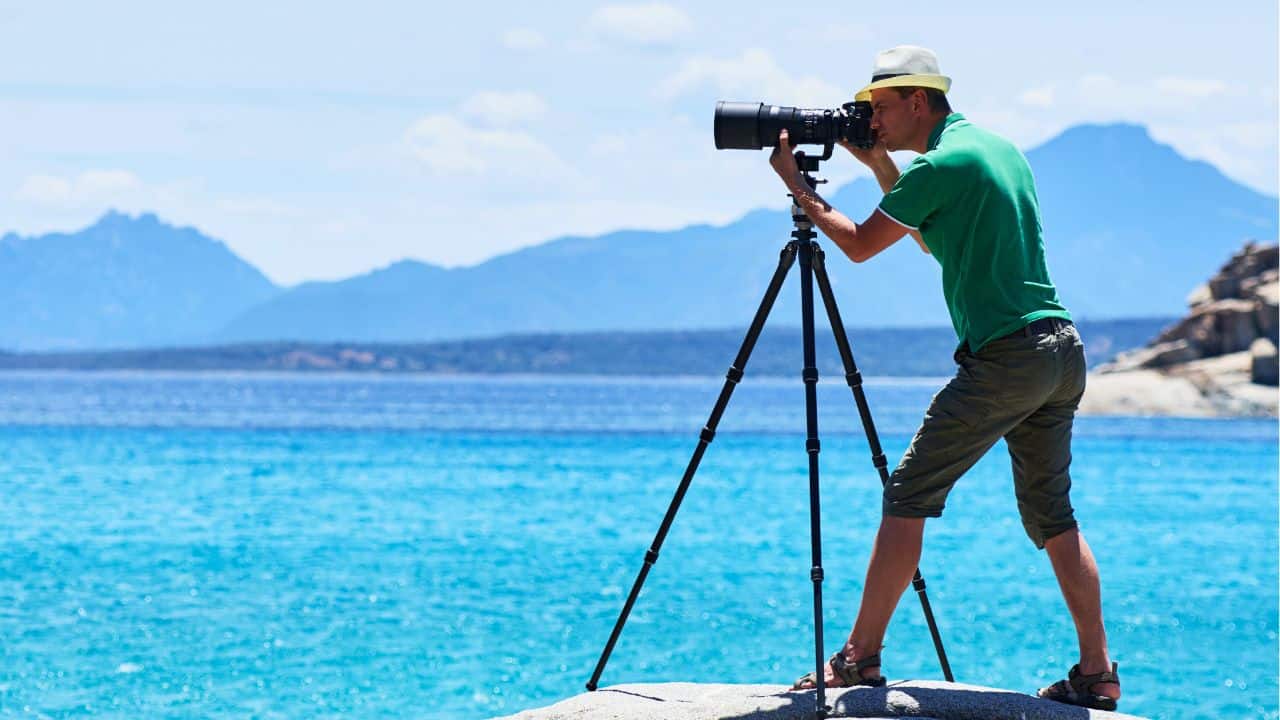Last Updated on October 30, 2023 by Nurul
In the world of photography, one piece of equipment stands, quite literally, as a foundational tool – the tripod. Whether you’re a budding hobbyist capturing memories or a seasoned professional shooting for a magazine cover, the tripod plays an instrumental role.
But with such a broad price range, from $20 to over $1000, is it genuinely worth investing in a high-end tripod? Let’s dive deep into this topic.
Contents
- What is the difference between a cheap and expensive tripod?
- Why are tripods so expensive?
- How much does a good tripod cost?
- How much should I spend on a camera tripod?
- FAQ: Is it worth buying an expensive tripod?
- Q1: Is it worth buying an expensive tripod for photography?
- Q2: Can a cheap tripod deliver the same results as an expensive one?
- Q3: Is an expensive tripod necessary for long-exposure shots?
- Q4: Are lightweight carbon fiber tripods worth the higher price?
- Q5: Is it worth buying an expensive tripod for smartphone photography?
- Q6: Can an expensive tripod improve video quality?
- Q7: Is an expensive tripod a must-have for landscape photography?
- Q8: Are there affordable alternatives to expensive tripods that perform well?
- Q9: Can an expensive tripod last longer than a cheaper one?
- Q10: Is it worth buying an expensive tripod for travel photography?
- Conclusion
What is the difference between a cheap and expensive tripod?
Tripods might look essentially the same at a glance – three legs and a platform for your camera. But the nuances in their build, design, and features can translate into significant differences in performance.
Build Quality
#Cheap Tripod:
Typically, budget tripods are constructed using lightweight materials such as aluminum or even plastic. While this may be great for portability, it could compromise on stability. The last thing you’d want is for your tripod to wobble during a long exposure shot or get knocked over by a gust of wind.
#Expensive Tripod:
These are the beasts of the tripod world. Often made from high-end materials like carbon fiber, they ensure maximum sturdiness. Carbon fiber, besides being tough, also absorbs vibrations, ensuring that your shots remain blur-free even in challenging conditions.
Features and Adjustability
#Cheap Tripod:
On the lower end of the spectrum, tripods usually come with limited head movement. You might find it challenging to tilt or pan smoothly. The height adjustments might also be restrictive, limiting your creative freedom.
#Expensive Tripod:
These tripods are where innovation shines. They come equipped with versatile head options, from ball heads that offer 360-degree movement to fluid heads that provide silky-smooth motion for video work. The leg adjustments on these tripods are also top-notch, with multiple angles allowing you to shoot even on uneven terrains.
Weight and Portability
#Cheap Tripod:
While they might be lightweight, remember, they could be sacrificing sturdiness for this advantage.
#Expensive Tripod:
Here, manufacturers masterfully balance weight with stability. Many high-end tripods, despite their robust build, are designed for portability and often come bundled with carrying cases or ergonomic straps for comfortable transport.
Longevity
#Cheap Tripod:
You might find yourself replacing a budget tripod every couple of years, as wear and tear show up quite quickly. Critical parts could break, or they might start becoming loose, affecting performance.
#Expensive Tripod:
These are built with a ‘buy it for life’ philosophy. Not only are they constructed to endure, but in the rare event something does wear out, manufacturers often make it easy to replace parts. Plus, the warranties and customer service are generally superior.
Why are tripods so expensive?
#Material Costs
The use of high-end materials, especially carbon fiber, can quickly ramp up the production costs. These materials, while costly, ensure longevity and performance.
#Research and Development
It’s not just about slapping three legs together. A lot of innovation goes into designing a top-tier tripod – from the ergonomics to specialized features. This R&D comes at a price.
#Brand Reputation
Reputed brands have years, sometimes decades, of experience. They have a legacy of reliability and consistent performance, and this reputation often carries a premium.
#Specialized Features
These are the cherries on top. Whether it’s spiked feet for grip on slippery terrains, a hook at the base to hang weights for added stability, or integrated leveling indicators – these features, while enhancing performance, also add to the cost.
How much does a good tripod cost?
While the price can vary based on brands and features, you can expect to pay anywhere from $100 for a decent basic tripod, to over $1000 for professional-grade gear. Remember, while the initial investment might seem steep, think of it as spreading the cost over the many years it will serve you.
How much should I spend on a camera tripod?
Consider Your Needs
Hobbyists and Beginners:
If you’re just dipping your toes into the world of photography or only take pictures occasionally, you might not need to go all out. A mid-range tripod, priced between $100 to $300, should suffice.
Professional Photographers:
For those who rely on their camera gear for a living, or are deeply passionate about the craft, investing in a high-quality tripod is non-negotiable. It ensures you’re equipped to handle any shooting scenario.
Consider Your Camera Gear
Your tripod needs to comfortably support your camera and lens. If you’re using heavier professional-grade DSLRs with large lenses, ensure the tripod’s weight capacity aligns.
Think Long-Term
Instead of buying a cheap tripod every few years, consider investing in a pricier one that could last a lifetime.
FAQ: Is it worth buying an expensive tripod?
Q1: Is it worth buying an expensive tripod for photography?
A1: Investing in a high-quality tripod can significantly improve your photography by providing stability and versatility. If you’re serious about photography, it’s worth considering.
Q2: Can a cheap tripod deliver the same results as an expensive one?
A2: While cheap tripods have their uses, they often lack the stability and durability of pricier options. For professional results, investing in an expensive tripod is usually recommended.
Q3: Is an expensive tripod necessary for long-exposure shots?
A3: Yes, an expensive tripod with robust construction and vibration reduction features is crucial for capturing sharp long exposure shots without camera shake.
Q4: Are lightweight carbon fiber tripods worth the higher price?
A4: Carbon fiber tripods are lighter and more robust than aluminum ones, making them worth the investment if you prioritize portability and stability.
Q5: Is it worth buying an expensive tripod for smartphone photography?
A5: High-quality tripods can enhance smartphone photography, especially for night photography or time-lapses. They offer stability and versatility for any camera type.
Q6: Can an expensive tripod improve video quality?
A6: Yes, expensive tripods often come with smoother pan and tilt capabilities, which are essential for professional video production. They can significantly enhance video quality.
Q7: Is an expensive tripod a must-have for landscape photography?
A7: Landscape photographers benefit greatly from expensive tripods due to their stability, height, and the ability to handle heavy camera gear. It’s a worthwhile investment.
Q8: Are there affordable alternatives to expensive tripods that perform well?
A8: Yes, there are some mid-range tripods that offer a good balance between price and performance. Research and read reviews to find the best option for your needs.
Q9: Can an expensive tripod last longer than a cheaper one?
A9: Generally, expensive tripods are built with higher-quality materials and craftsmanship, so they tend to last longer and provide a better return on investment.
Q10: Is it worth buying an expensive tripod for travel photography?
A10: For travel photography, a lightweight and durable tripod is essential. While expensive, it’s worth it for capturing stunning photos on your adventures without compromising quality.
Conclusion
In the realm of photography, a tripod isn’t just a tool; it’s an extension of your creative vision. By ensuring stability, offering versatility, and lasting a lifetime, a good tripod can elevate your photography to new heights.
While an expensive tripod might seem like a luxury, when seen as a long-term investment in your craft, it becomes a necessity.

Hi, I’m Nurul! I love touching the latest gadget, unboxing them, and even smelling them! In this blog, I will share all my experiences. Hope you get the right idea about all kinds of gadgets from this blog.

